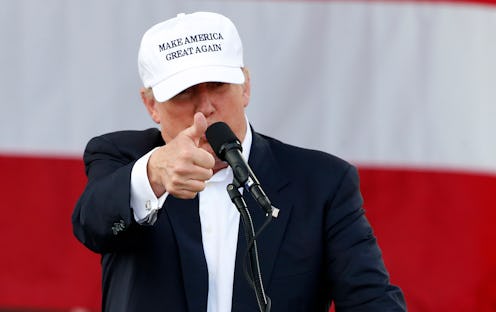News
How Donald Trump Could Be Removed From Office
For millions, if not billions, of people around the world and in the United States, the idea of a Donald Trump presidency is very, very scary. If you belong to any of the groups that he has criticized, offended, demeaned, and/or discriminated against, you probably know what I'm talking about. The very possibility that Trump could be president is enough to make you panic and wish for a way to circumvent the system in order to kick him out of office. Thankfully, the 25th Amendment may provide the solution you've been praying for. Donald Trump could be removed from office if he wins, but there are a few hurdles that his administration would have to jump through before he could get the boot.
The 25th Amendment was ratified rather fortuitously in 1967 by President Lyndon B. Johnson, simply because the rules of presidential succession had been vague up until that point. It was used for the first time just a few years later in 1973, when President Richard Nixon nominated Gerald Ford to replace his former vice president, Spiro Agnew, who was indicted for tax evasion. Then, less than one year later, the Amendment was invoked again when Nixon resigned in the wake of the Watergate Scandal. So far, those are the only two major instances of the Amendment's use, but if Trump becomes president, that could change.
The 25th Amendment primarily denotes use in the case of death or resignation, but Section Four does provide a procedure for the removal of the president by the vice president and the Cabinet:
Whenever the Vice President and a majority of either the principal officers of the executive departments or of such other body as Congress may by law provide, transmit to the President pro tempore of the Senate and the Speaker of the House of Representatives their written declaration that the President is unable to discharge the powers and duties of his office, the Vice President shall immediately assume the powers and duties of the office as Acting President.
In this case, it would most likely be easier to get a majority of Congress than a majority of the Cabinet. Since the Cabinet is appointed by the president, Trump would likely stock it full of ardent believers who think he would be great. A majority of Congress, however, may be more easily attained. Most Democrats are a relatively safe bet to join the written declaration, and there are plenty of Republicans who would also rather see Mike Pence in the Oval Office, too.
The biggest obstacle in this hypothetical is Pence. He and Trump don't appear to have the best relationship — Pence condemned Trump for his remarks in the 2005 Access Hollywood tape, and they each spoke somewhat poorly of each other during the debates. Still, it's a long leap to assume that Pence would try to kick Trump out of office. The 25th Amendment does allow for the removal in a democratic manner, but in essence, it's still a coup. It's never happened before, and setting that precedent could set the U.S. on a new course for the federal government, wherein no president is safe from potential removal.
After this first step, the vice president and Congress would have to reaffirm their decision upon the (surely inevitable) behest of the president. The rules of the 25th Amendment continue:
Thereafter, when the President transmits to the President pro tempore of the Senate and the Speaker of the House of Representatives his written declaration that no inability exists, he shall resume the powers and duties of his office unless the Vice President and a majority of either the principal officers of the executive department or of such other body as Congress may by law provide, transmit within four days to the President pro tempore of the Senate and the Speaker of the House of Representatives their written declaration that the President is unable to discharge the powers and duties of his office.
If they think it is truly the right move, then it is the responsibility and duty of the vice president and Congress to remove the president. However, this is obviously not a decision to be made lightly. Even with all the frightening possibilities of a Trump presidency, the continuity of the American presidency is a precious national tradition that should only be abandoned after great deliberation.
Unfortunately, the country may have brought itself to that point. "The lesser of two evils" in this campaign has referred to the choice between Trump and Hillary Clinton, but it may really be the choice between respecting the democratic election of a demagogue or using unprecedented measures to remove him from office.
